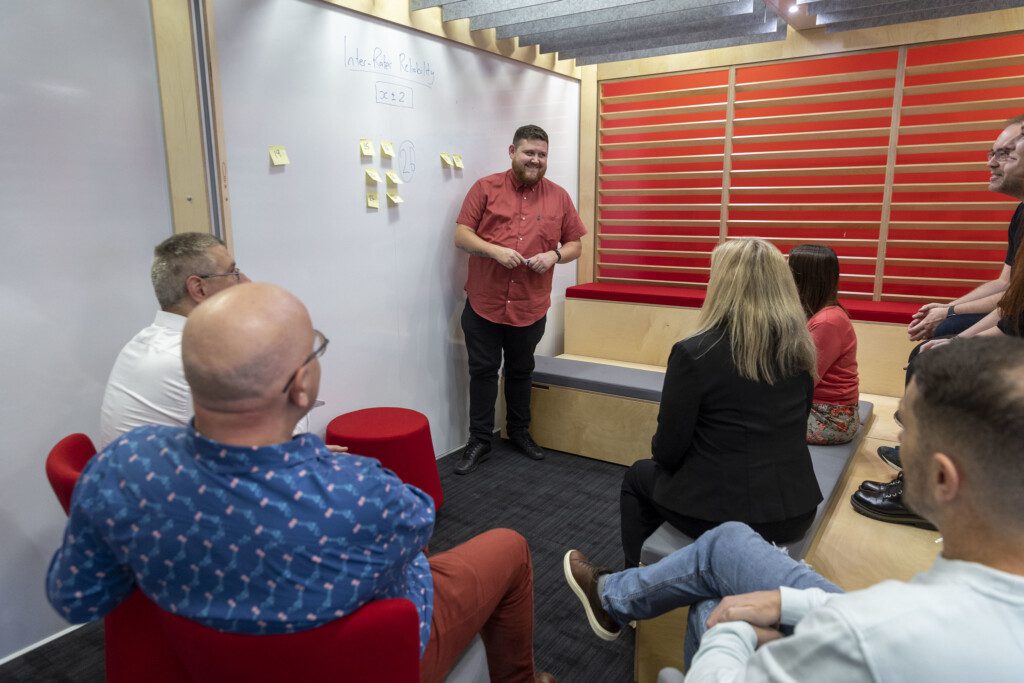How training courses run by Community Justice Scotland are helping to make a difference
David Scott, CJS’s Head of Learning, Development & Innovation reveals some of the very positive feedback received for training delivered right across Scotland
We’ve had a busy year delivering essential training for people to be able to do their jobs across the justice sector. And we’re delighted that feedback shows 94% of people agreed our training was delivered to a high standard.
According to a recent survey, almost three-quarters of our stakeholders or their colleagues have attended training delivered by us. Ratings across all aspects of training were very high and the majority of attendees agreed strongly with each statement. Trainers were particularly highly praised.
We’re really pleased that we’ve been able to make a difference – helping our colleagues in the justice sector develop and widen skills for their day-to-day work. And this will have a positive impact on the individuals they’re working with who are in touch with the justice system.
We have nine colleagues across our learning, development, innovation and Caledonian team who deliver training right across Scotland. The range of expertise in the training team is one of our greatest assets. Across the whole team we have people with backgrounds in teaching, social work, police, intelligence analysis, prison work, counselling, youth work and NHS statistics. Qualifications include postgraduate diplomas in social work and education. When we sit down together to design training we’re bringing a whole array of skills, experiences and knowledge to the table.

And we’ve had some very positive feedback. One person said: “I could not improve it. The course went over and above my expectations.”
More than 1,500 course places were filled in 2022-23 covering all 32 local authority areas across Scotland. Attendees have included justice social workers, people involved in the delivery of unpaid work and restorative justice practitioners. We ran 241 days of live training sessions in person or on Teams and 191 days of training via self-paced working.
In-person training has proved really helpful with one person explaining: “It gave everyone the opportunity to practice group work skills in a safe space.”
But there was also praise for online training. “I really enjoyed the training — very useful to my practice, and engaging throughout. Maybe the best virtual training I’ve been on,” said one attendee.
Getting the balance right between online and face-to-face learning is so important to us. The people we train are incredibly busy and they can’t always drop everything to attend a training day. That’s why it’s so good to know that our online training hits the spot.
Training gave justice professionals a boost. “I now feel a lot more confident in my skills and abilities,” said one. We deliver training on a range of skills to help professionals best support people in the justice system. That includes risk assessment tools, specific practice and group work skills, report writing, restorative justice, Caledonian system domestic abuse work and skills needed for professionals who are supporting those carrying out community sentences.
Our work helps people address the specific needs of individuals who have broken the law to help reduce reoffending and make Scotland safer. Some courses are mandatory – for instance justice social workers wouldn’t be able to do their jobs without the skills taught in our training. We’ve introduced new courses due to demand and now train people involved in the delivery of unpaid work – for those working with people who are carrying out community payback orders. Our team developed a five-day course for those involved in supporting people carrying out unpaid work, which has been approved by Social Work Scotland. This was launched in July and acknowledges the important work being done in the community to support people to complete their sentences.
One person who took part said: “The workers were very professional in the delivery of the training. I find workers very flexible and accommodating and I have an excellent working relationship with the training team.”

New training has also been introduced for restorative justice practitioners and there’s also training in throughcare assessment for release on licence which is for social workers dealing with individuals being considered for parole.
We also deliver training in LS/CMI (level of service/ case management inventory) which is the keystone in risk and needs assessment used to better understand what’s going on for a person who’s broken the law. LS/CMI draws on a vast international evidence base so we know it works well but better still, it’s been adapted for practice in Scotland. The Risk Management Authority worked to make the LS/CMI system even more useful to our sheriffs, social workers and everyone involved in supporting someone to get the most out of their sentence.
A community payback order with supervision for example is based on a really detailed LS/CMI. It helps social workers to focus on the right things when they’re working with people serving their sentence and reduces the likelihood of reoffending by targeting areas like employment, education, relationships and drug/alcohol use. Justice social workers need to complete their LS/CMI training with us so we meet professionals at all stages of their careers: some who are newly qualified, fresh out of university and others who may have been in the field for years but are just moving into a justice role.
Feedback for LS/CMI shows 99% agreed training was delivered to a high standard and provided a high quality learning experience. There has been so much praise for our trainers. “I really enjoyed the course and felt the trainer’s positive and upbeat attitude kept everyone motivated,” reported one person.
Training has helped people with their work. One said: “The course reflected my work context perfectly.”
And the training has left its mark. One person said: “Massive impact, it will shape me into a more mindful practitioner.”
Key statistics at a glance from 2022/23:


